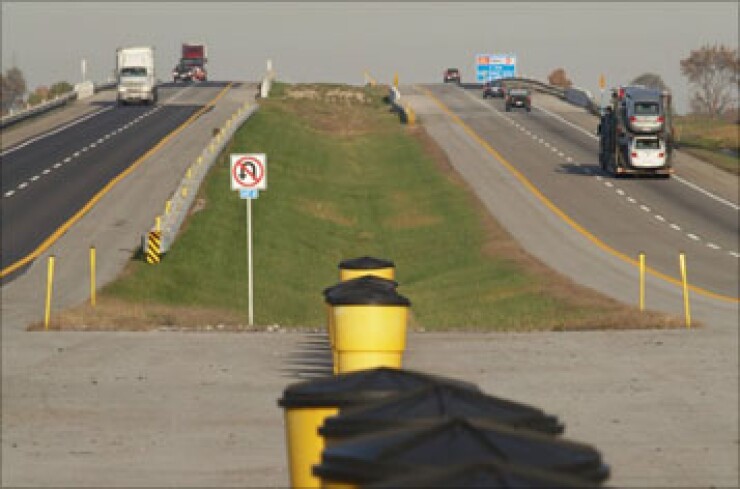
CHICAGO — A group of northwest Indiana counties is eyeing a bid for a 75-year lease of the Indiana Toll Road that would be financed with more than $4 billion of tax-exempt revenue bonds.
LaPorte County, Ind., about an hour outside Chicago and one of several counties that runs along the toll road, is leading the charge.
The county hired Piper Jaffray to analyze the feasibility of a bid financed with non-recourse toll revenue-backed bonds issued through a non-profit conduit.
The county has also hired Chicago-based law firm Goldstein & McClintock LLP as special counsel.
In 2006, Indiana leased the road for 75 years for $3.8 billion, marking the largest privatization of a public asset to date.
ITR Concession Co., the operator of the 157-mile tollway, declared Chapter 11 bankruptcy in September. The company, a subsidiary of Macquarie Infrastructure Partners, Macquarie Atlas Roads and Cintra, struggled with overly optimistic traffic projections coupled with a debt-heavy capital structure and a $2.15 billion liability tied to swaps.
Under its recently approved bankruptcy plan, ITR would either sell the lease to a new operator or restructure with $2.75 billion of new debt. The plan gives the firm until August 2015 to find a buyer to take over the lease. Final bids are due in February.
The asset is generating a lot of interest in the private market, according to one source with knowledge of the situation who asked to remain anonymous.
"There's not a lot of infrastructure assets out there of this scope and size," the source said. "There are almost irrational equity levels being discussed."
Private equity bids are expected to come in as high as $5 billion, according to various reports. One of the interested bidders is Cintra, the current operator, partnered with the Canadian Pension Plan Investment Board, according to Piper Jaffray.
The counties would need to float a minimum bid of $4.1 billion and likely more, according to the Piper Jaffray
"Four billion would not be enough to win the bid, that's apparent to anyone who's following the bankruptcy process," the source said. "The question is would the municipal market be able to sustain more than $4 billion; will the projected revenues allow for the larger number?"
Piper Jaffray, in its analysis, noted that the current muni market is "favorable for a potential public acquisition (low municipal supply and significant demand for high-yield municipal debt)."
The ability to use tax-exempt debt to finance a bid would give the counties an advantage, according to LaPorte County Attorney Shaw Friedman. Citing non-disclosure agreements imposed on all potential bidders, Piper Jaffray and Friedman declined to comment directly on the proposal.
But in a statement, Friedman noted that a public deal would "take advantage of the low cost of capital provided by tax-exempt municipal debt which is not available to the private bidders." He emphasized that the bonds would be "no recourse," meaning that none of the counties would attach any pledges to the debt.
Goldstein & McClintock is preparing resolutions for consideration by counties that may join the consortium as well as the documents necessary to meet the bid requirements, according to Shaw.
A public deal would likely feature a mix of senior- and subordinate-lien bonds issued through a not-for-profit conduit issuer. The counties would hire a private firm to operate the road. There would be no state involvement. In a statement, La Porte County Commissioner Dave Decker said the Piper Jaffray analysis supports a claim by U.S. Sen. Joe Donnelly, D-Ind., who has urged the state to consider buying back the asset.
"With the toll increases, the Indiana Toll Road is now a highly lucrative, revenue generating asset," Decker said. "The LaPorte County Commissioners believe that rather than shipping toll road profits off to European banks and hedge funds for the next 67 years, let's keep that money here at home to help fix roads, bridges, streets, water and sewer systems right in our own communities."
Indiana officials have said the state has no interest in buying back the asset, and note that any new operator will be bound by the same lease terms, including toll rate caps, as the ITR.





